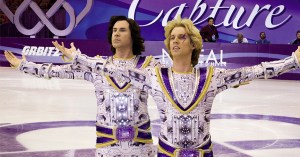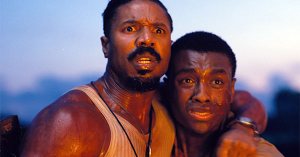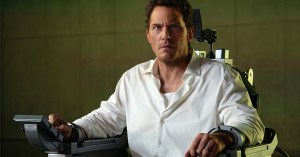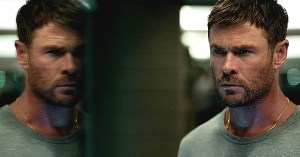Total Recall: Winona Ryder’s Best Movies
We count down the best-reviewed work of the Dilemma star.
Winona Ryder was one of the more prolific film stars of the late 1980s and early 1990s, appearing in almost 20 movies over the space of a decade and working with some of the industry’s most respected actors and directors along the way. Her pace has slowed in recent years, but with roles in Black Swan and this weekend’s The Dilemma, Winona’s pulling double duty at the box office — which, naturally, got us thinking about the many highlights of an eclectic filmography that includes teen comedies, period dramas, and plenty in between. How do your favorites stack up against the critics’? It’s time to find out!
10. Night on Earth
A series of loosely interconnected vignettes from writer/director Jim Jarmusch, 1991’s Night on Earth gave Ryder a chance to move away from teenage roles by casting her in the film’s opening segment, as a driver who develops an unexpected connection with a Hollywood executive (Gena Rowlands) while ferrying her from the airport. While Night didn’t offer Ryder as much screen time as some of her other films, it offered a glimpse at the more experimental fare she’d dabble in later (such as Richard Linklater’s A Scanner Darkly), and impressed critics like Roger Ebert, who wrote, “At the end, we have learned no great lessons and arrived at no thrilling conclusions, but we have shared the community of the night, when people are unbuttoned and vulnerable — more ready to speak about what’s really on their minds.”
9. The Crucible
With a screenplay adapted by Arthur Miller from his own play, director Nicholas Hytner (The Madness of King George) at the helm, and a cast that included Ryder, Daniel-Day Lewis, Paul Scofield, and Joan Allen, The Crucible looked like the can’t-miss art house hit of 1996. Things didn’t quite work out that way — it barely made back half of its budget — but even if it wasn’t a commercial success, the big-screen version of Miller’s allegorical account of the McCarthy witch hunts, set against the backdrop of one teenage girl’s hysterical accusation during the Salem trials, its stars earned critical praise for their work. “There’s an awful, piercing truth in the performances of Daniel Day-Lewis, Winona Ryder, Joan Allen and Paul Scofield as members of a community destroyed by guilt, paranoia and betrayal,” wrote Edward Guthmann of the San Francisco Chronicle.
8. Mermaids
It takes a special kind of screen presence to keep from being steamrolled by Cher at her scene-stealing best, and that goes double for any movie where she gets to play a “free spirit” — but even though it was Cher’s name getting first billing above the title, Winona Ryder walked away with Mermaids, adding genuine pathos to what could have been a decidedly unmemorable melodrama about the struggles of a 15-year-old girl (Ryder) to find herself in the shadow of her aggressively independent single mother (Cher). “Having made something of a specialty of woe-is-me, adolescent angst, Ryder finds a deeper level here,” observed Hal Hinson of the Washington Post, identifying it as “a level of comedy with something genuinely painful mixed in.”
7. Beetlejuice
You’ve seen a lot of movies about people hiring exorcists to get rid of ghosts. But what if ghosts could hire someone to get rid of people? That was the novel idea behind Beetlejuice, the gleefully unhinged Gothic comedy that cemented Tim Burton’s bankability, gave Ryder an early breakthrough after her supporting role in Lucas, and simply let Michael Keaton run wild as a demented “bio-exorcist” summoned by recently deceased newlyweds (Geena Davis and Alec Baldwin) to repel the family that has moved into their home. Calling it “Tim Burton’s freshest work, and perhaps the purest embodiment of his funky world view,” Rob Vaux of Flipside Movie Emporium noted, “Count the number of people whose careers were made here; that’s no fluke.”
6. The Age of Innocence
A year after scoring a leading role for Francis Ford Coppola in Dracula, Ryder went to work for another great American director — and earned an Academy Award nomination along the way — in Martin Scorsese’s The Age of Innocence. Adapted from Edith Wharton’s 1920 novel, Innocence gave Ryder the chance to hone her dramatic chops with a tremendous cast, including Daniel Day-Lewis and Michelle Pfeiffer, and gave fans of tightly corseted love stories a reason to bring their hankies to the theater. “When the movie was over,” sighed an appreciative Steve Rhodes, “I could hardly move.”
5. Bram Stoker’s Dracula
Ryder joined her fondness for period pictures with her affinity for gothic-tinged characters in Bram Stoker’s Dracula, Francis Ford Coppola’s beautifully filmed, proudly overblown take on the classic vampire legend. Surrounded by a marquee-worthy cast that included Gary Oldman, Keanu Reeves, and Anthony Hopkins, Ryder held her own; their performances helped scare up a $215 million gross that restored some of the fading lustre to Coppola’s career. “Coppola never stops putting on his own showboat performance,” wrote Rob Gonsalves of eFilmCritic, adding, “His Dracula isn’t like anything else around.”
4. Black Swan
For those of us who remember Ryder’s days as a fresh-faced ingenue who racked up teenaged roles in the 1980s and 1990s — and who was playing love-interest roles, a la her part in Mr. Deeds, in the early aughts — it came as something of a shock to see her appear as Natalie Portman’s discarded predecessor in Black Swan. (Sure, she also played Spock’s mom in the Star Trek reboot, but that was a blink-and-you-missed-it bit part.) But if she was graduating to a new generation of characters, Ryder remained as attracted to challenging, high-quality scripts as ever, and although Portman and Mila Kunis were unquestionably the stars of this Darren Aronofsky drama, Swan still gave Ryder an opportunity to be part of one of the best-reviewed films of 2010. “This is, no doubt about it, a tour de force,” wrote David Edelstein of New York Magazine, calling it “a work that fully lives up to its director’s ambitions.
3. Little Women
For many books, one film adaptation is more than enough — but not Louisa May Alcott’s Little Women, the 19th century classic that took its fifth trip before the cameras in 1994. Given the parade of Women that came first — including George Cukor’s classic take on the book — director Gillian Armstrong had her work cut out for her. Fortunately, she also had a solid screenplay by Robin Swicord (Memoirs of a Geisha), as well as a terrific cast that included Susan Sarandon, Claire Danes, Kirsten Dunst, and — as the headstrong Jo — Winona Ryder. Acknowledging prior adaptations, Janet Maslin of the New York Times wrote, “Ladies, get out your hand-hemmed handkerchiefs for the loveliest Little Women ever on screen.”
2. Edward Scissorhands
1990 was a pretty good year for Ryder — while Welcome Home, Roxy Carmichael didn’t do so well with audiences or critics, it was also the year she released Mermaids and a little flick called Edward Scissorhands. Playing to Ryder’s gift for playing soulful, doe-eyed teens with an outsider streak, Scissorhands reunited her with Beetlejuice director Tim Burton and gave her a chance to co-star with then-boyfriend Johnny Depp — and it was also a hit at the box office, as well as with scribes like Rolling Stone’s Peter Travers, who wrote, “Burton’s richly entertaining update of the Frankenstein story is the year’s most comic, romantic and haunting film fantasy.”
1. Heathers
You knew we were going to end up here. It was roundly ignored during its theatrical run, but Heathers is now regarded as one of the best teen comedies — heck, best comedies — of the 1980s. Starring Ryder as a disgruntled member of her high school’s popular clique and Christian Slater as the homicidal drifter looking for a little help purging the cool kids, Heathers gave its two young leads a burst of counter-culture cachet while impressing critics like Todd McCarthy of Variety, who called it “A super-smart black comedy about high school politics” while noting that it “showcases a host of promising young talents.” Sequels and adaptations have been rumored for years, but Heathers is just fine the way it is — here’s hoping Hollywood leaves well enough alone.
In case you were wondering, here are Ryder’s top 10 movies according RT users’ scores:
1. Night on Earth — 91%
2. Edward Scissorhands — 88%
3. Black Swan — 88%
4. Girl, Interrupted — 83%
5. Heathers — 82%
6. Bram Stoker’s Dracula — 79%
7. Little Women — 79%
8. Reality Bites — 74%
9. The Age of Innocence — 73%
10. The House of the Spirits — 73%
Take a look through Ryder’s complete filmography, as well as the rest of our Total Recall archives. And don’t forget to check out the reviews for The Dilemma.
Finally, here’s Ryder in one of her finest performances, playing Debbie Gibson:






